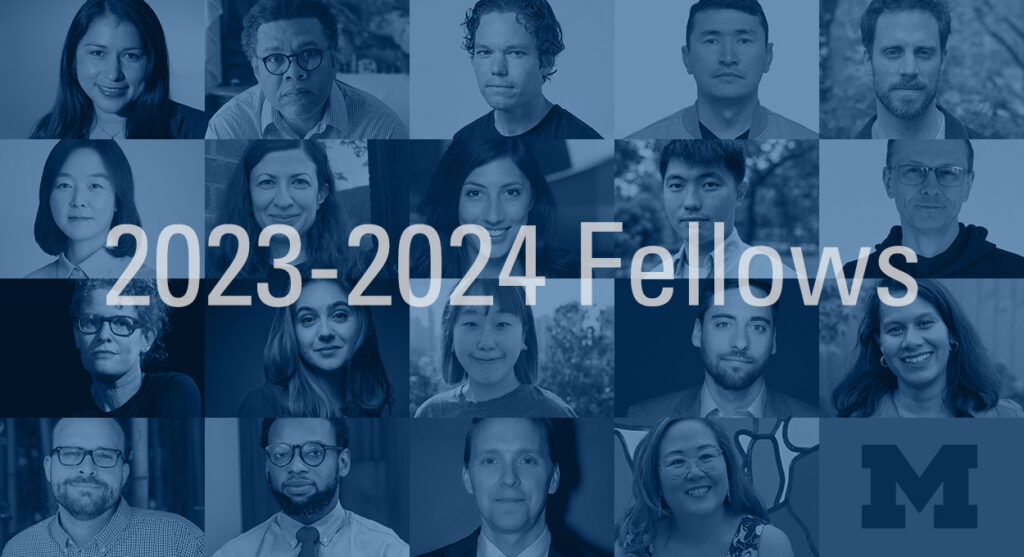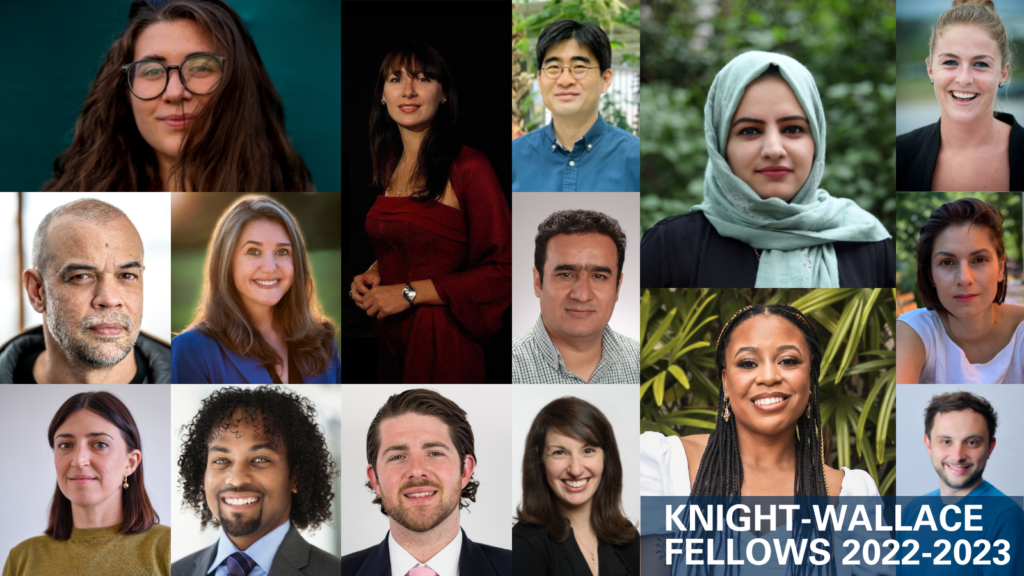
Wallace House Center for Journalists and the University of Michigan are pleased to announce the Knight-Wallace Journalism Fellows for the 2024-2025 academic year. This cohort of 18 accomplished journalists from nine countries and a broad cross-section of the U.S. marks the 51st class of Fellows in our program’s history.
The Knight-Wallace Journalism Fellows will pursue ambitious journalism projects, immerse themselves in university courses and participate in weekly seminars with journalism leaders, renowned scholars, media innovators and social change agents.
“We’re honored to introduce the newest cohort of Knight-Wallace Fellows, whose expertise spans a diverse array of critical topics,” said Lynette Clemetson, Director of Wallace House. “Their projects will delve into pressing issues such as protecting vulnerable sources, navigating the implications of technological advancements and supporting reporters in hostile environments. Through their collaborative, cross-disciplinary efforts, they’re poised to make a profound impact not only within journalism but also in the communities they serve.”
In addition to the academic and intellectual resources provided, Fellows will receive $90,000 in stipend and relocation support over nine months, an increase to help the journalists in our program weather industry instability and rising housing prices. Fellows will reside in the Ann Arbor area and enjoy most seminars at Wallace House, a gift from the late newsman Mike Wallace and his wife Mary, and the program’s home base.
Wallace House’s Knight-Wallace Fellowship program is funded through endowment gifts from foundations, news organizations, individuals and ongoing contributions from funders committed to journalism’s role in fostering an informed and engaged public.
The 2024-2025 Knight-Wallace Fellows and Their Journalism Projects:
Dieu-Nalio Chery is a freelance photojournalist from Haiti. He has documented the profound beauty, searing pain and upheaval in his homeland for The Associated Press, and many of his images have become iconic records of Haiti in the 21st century. His work will illuminate the larger story of the Haitian diaspora and combat common stereotypes.
Baktygul Chynybaeva is a journalist from Kyrgyzstan who has covered healthcare, environmental and human rights issues. She will explore avenues for achieving media independence in Kyrgyzstan, Tajikistan and Uzbekistan despite the countries’ economic and media dependencies on Russia.
Denise Guerra is an audio journalist and co-founder of popular news podcasts who focuses on breaking news and narrative storytelling. She will examine how short-form videos affect news consumption and how both news consumers and news creators can best utilize this evolving medium.
Cassie Haynes, J.D., M.P.H., the co-founder of the nonprofit journalism organization, Resolve Philly, is a journalism strategist with executive experience in government, corporate and nonprofit sectors. She will research mechanisms that enable newsrooms to quantify and predict the impact of their reporting on the evolution of social narratives.
Fatemeh Jamalpour is an Iranian journalist who has been interrogated, arrested and jailed by the Iranian government because of her human rights-focused reporting. Her study project will examine Iranian society’s move towards secularization.
Kwanseok Jang is a political reporter with the Seoul-based daily newspaper Dong-A Ilbo. He has 15 years of experience in journalism, including three years covering presidential and administrative policy-making processes. He will explore tensions between the public’s right to information, individual privacy rights and political partisanship, with a focus on the U.S. presidential elections.
Ally Jarmanning is a senior reporter at WBUR in Boston, where she focuses on accountability stories using data and public records. Based on her work with victims of police brutality and survivors of domestic and sexual violence, Jarmanning will create a guide for working with vulnerable sources.
Kunāl Majumder serves as the India Representative for the Committee to Protect Journalists, where he documents and researches press freedom issues and advocates for journalists’ safety. He will engage with diverse experts in public policy, democracy and media studies, exploring ways to advance protections for journalists.
Zahra Nader is the founding editor-in-chief of Zan Times, a non-profit news outlet that covers women, gender-based issues and human rights in Taliban-controlled Afghanistan. She will study business models and management strategies tailored to the needs of entrepreneurial journalists in exile.
Katie O’Brien is a two-time Emmy Award-winning producer at ABC News. She has reported from more than 30 U.S. states and covered dynamic and pivotal stories. She will explore multiple facets of juror biases, including studying juror selection processes and cutting-edge strategies for detecting juror biases through Artificial Intelligence algorithms.
Sarah Rahal is the lead city reporter for The Detroit News, where she covers developments within Detroit City Hall and spotlights important local issues. She will research the challenges and successes that municipalities face as they support refugees and asylum seekers as well as the impact of growing refugee communities on local politics, economics and culture.
Nada Rashwan reports on the Middle East and North Africa with a focus on politics and society in Egypt. She will investigate strategies for engaging youth and producing nuanced journalism under repressive governments, particularly in Egypt and other countries in the Middle East that actively censor the media.
Holger Roonemaa manages the investigative and fact-checking team at the daily news site Delfi Estonia. He is also an editor with the Organized Crime and Corruption Reporting Project (OCCRP). He will develop an investigative journalism hub designed to bridge resource gaps, make use of high-tech investigative methods and bolster data-driven regional partnerships.
Davy Rothbart is an Emmy Award-winning filmmaker, journalist, bestselling author, creator of Found Magazine and a frequent contributor to public radio’s “This American Life.” He will explore the challenges facing wrongfully convicted inmates who lack DNA evidence and examine cases where innocence has still been established despite the obstacles.
Laura Santhanam is a health reporter and coordinating producer for polling at “PBS NewsHour.” She will study what both health professionals and journalists learned about public health messaging from the COVID pandemic and how to more effectively combat misinformation and build trust going forward.
Summer Sewell is an independent journalist who most recently worked as a contributing editor for special packages at Mother Jones. Through narrative storytelling, Sewell will trace the trajectories of two families, one black and one white, who have farmed over generations– recounting the families’ setbacks and triumphs and directly comparing their lost and gained generational wealth.
Joseph Sywenkyj is an American photographer of Ukrainian descent who has lived and worked in Ukraine for approximately 20 years. He will study how the psychology and sociology of war trauma change the identity of individual Ukrainians as well as the shared identity of the nation.
Anastasia Tsioulcas is a correspondent on NPR’s Culture desk and also contributes as a classical music critic to The New York Times, the first journalist to hold such a dual role. As a joint fellow with the University of Michigan Arts Initiative, Tsioulcas will research the effectiveness of recent diversity efforts, with a focus on Detroit and the surrounding region.
Read more about the 2024-2025 Knight-Wallace Fellows and their journalism projects »
About Wallace House Center for Journalists
Committed to fostering excellence in journalism, Wallace House at the University of Michigan is home to the Knight-Wallace Fellowships, the Livingston Awards and the Wallace House Presents event series, programs that recognize exceptional journalists for their work, leadership and potential.
wallacehouse.umich.edu


